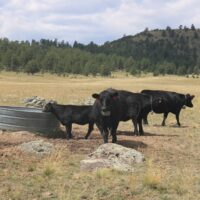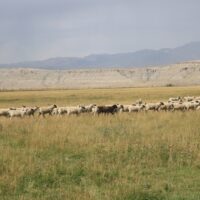Colorado's Badger Creek Ranch is using electric collars to guide cattle to water—and away from sensitive areas. Read more
In 2023 and 2024, LOR’s Field Work initiative invested more than $600,000 into research that explored innovative approaches to using water in agriculture.
Facing drought and an ever-increasing demand for agricultural food products, Western farmers and ranchers are on the frontlines of the fight to solve water challenges. Too often, however, funding for innovative techniques that might improve water usage is hard to access and slow to reach the experts on the ground. So in 2023, LOR launched Field Work. Field Work is LOR’s search for innovative answers to persistent problems that plague rural communities. Our goal with each Field Work effort is to get money quickly into the hands of the people on the ground—in communities where LOR works or in other rural parts of the region—who have innovative ideas.
In 2023 and 2024, Field Work’s focus was on water and agriculture. Farmers and ranchers in rural parts of Colorado, Idaho, Montana, New Mexico, and Wyoming were eligible for up to $10,000 to implement creative water projects on their land (think: improved water efficiency, water reliability, water quality, crop yield or crop diversification, and labor efficiency). LOR awarded more than $500,000 in 2023, and in 2024, with generous support from CoBank, Field Work provided an additional $95,000 in funding.
Between 2023 and 2024, LOR provided Field Work funding to more than 70 farmers and ranchers, some of whom were subsequently featured in TIME magazine. These folks are the experimenters, tinkerers, innovators, and iterators who, for decades—even generations—have been finding ways to eke out a living from the land. They’re people who have a vested interest in finding ways to use water more effectively—for their own operations and for the good of the West. Meet them.
If you would like to stay in touch about Field Work, please email connect@lorfoundation.org with Field Work in the subject line.
Sheep ranches across the West are finding both financial and agricultural value in what was previously considered worthless wool. Read more
Every minute counts on a farm or ranch. These innovations are helping agricultural producers across the Mountain West get some of that time back. Read more


